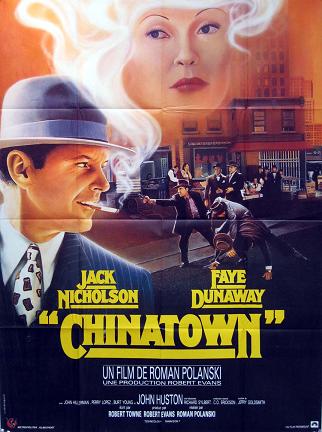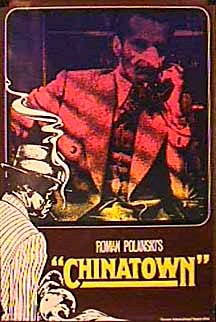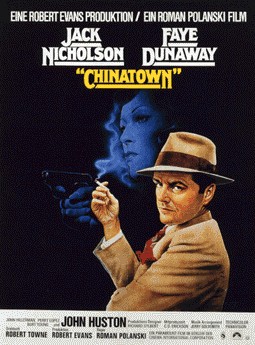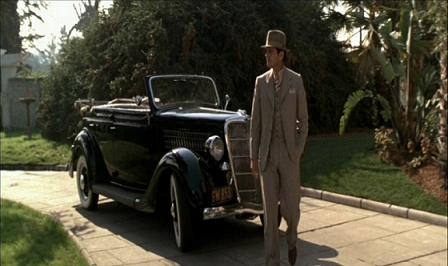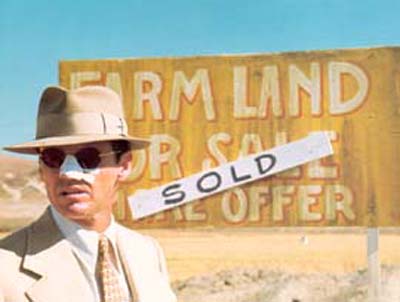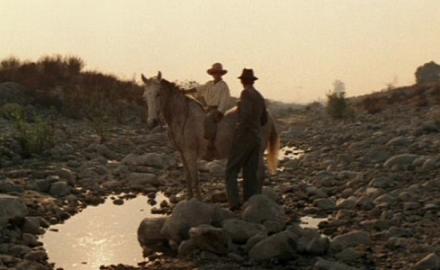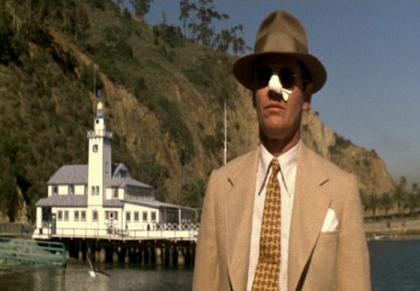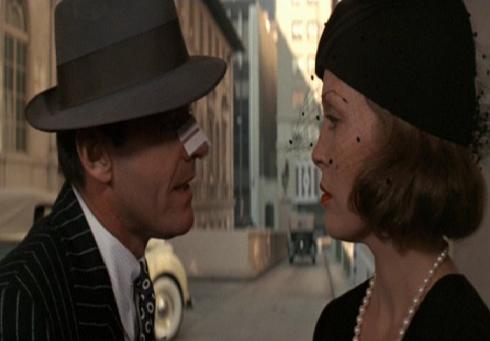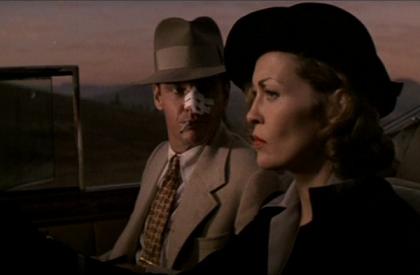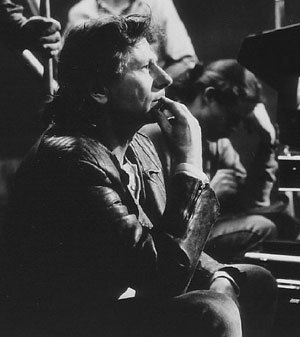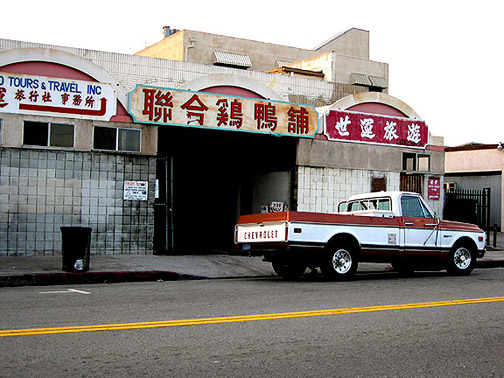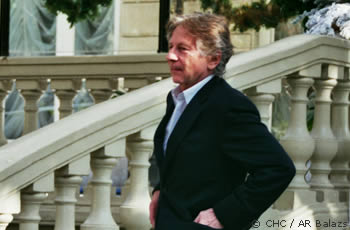 | Roman Polanski''s CHINATOWN |
|
|
|
|
|
|
|
|
|
|
|
|
|
Roman Polanski |
Chinatown |
Roman Polanski |
http://www.celluloiddreams.co.uk/romanpolanski.html - Roman Polanski
"Forget it, Jake. It''s Chinatown."--Walsh (Joe Mantell) to Jake Gittes (Jack Nicholson)"It looks like half the city is trying to cover it all up, which is fine with me. But Mrs. Mulwray, I...near lost my nose! And I like it. I like breathing through it. And I still think you''re hiding something."--Jake Gittes to Evelyn Mulwray (Faye Dunaway)
"I''m just a snoop."--Jake Gittes
Polanski went to painstaking lengths to have the film very authentically capture 1930s Los Angeles because the story is based on actual events from the city''s history.
Many films from the 1970s allow even the most gripping narratives to flow with the consequences of real life. CHINATOWN is a classic film whose intrigues and adventures culminate in life-changing moments for its protagonist, Jake Gittes (Jack Nicholson).
Director Roman Polanski''s classic neo-noir detective story is set during a heat wave in 1930s Los Angeles, where residents suffer from a water shortage due to an ongoing drought. With stellar contributions from composer Jerry Goldsmith and screenwriter Robert Towne, whose script recalls the hard-boiled cynicism of Raymond Chandler and Dashiell Hammett, CHINATOWN is a complex and superbly crafted period drama that has become Polanski''s most critically acclaimed film. Private investigator Gittes runs a sleazy detective agency. When a client (Diane Ladd) hires him to spy on her "husband," who is rumored to be having an affair with a younger woman, Jake uncovers a plot against the man--but this is only the tip of the iceberg. Yet to emerge are a sex scandal implicating the real wife (Faye Dunaway), with whom Jake is destined to become more closely acquainted - and a real estate swindle of tremendous proportions devised by her tycoon father (John Huston), backed up by a vast network of corrupt city officials and landowners who make life hell for the private eye.
This story crystallizes the impact of a chance meeting with the romantic ideals of the early 1970s, when the American urban landscape and economic power structures were in flux.
Theatrical release: June 21, 1974Filmed in Los Angeles, California.
CHINATOWN is number 19 on the American Film InstituteЖs list of America''s 100 Greatest Movies.
CHINATOWN was added to the Library of Congress National Film Registry in 1991.
A landmark movie in the film noir tradition, Roman Polanski''s Chinatown stands as a true screen classic.
Jack Nicholson is private eye Jake Gittes, living off the murky moral climate of sunbaked, pre-war Southern California. Hired by a beautiful socialite to investigate her husband''s extra-marital affair, Gittes is swept into a maelstrom of double dealings and deadly deceits, uncovering a web of personal and political scandals that come crashing together for one, unforgettable night in… Chinatown.
Co-starring film legend John Huston and featuring an Academy Award-winning script by Robert Towne, Chinatown captures a lost era in a masterfully woven movie that remains a timeless gem.
There are a lot of reasons why "Chinatown", Roman Polanski''s classic from 1974, is often described as the first neo-noir. On one side, we have all the traditional ingredients of a film noir in the sense of Billy Wilder and John Huston: a mysterious femme fatale, a tough guy who - confronted with beauty - becomes tender, a suspenseful plot full of ambiguities, a highly sensual atmosphere and very stylish lighting and camerawork. We can find that all in the beautiful noir films from the 1940s. But then, in the midst of the 1970s New Hollywood movement, Polanski and screenwriter Robert Towne have broken the rules, if there''s such a thing as rules. While the opening credits have a nice old-fashioned look, the first shots of the film introduce us to a new kind of noir. A noir shot in cinemascope and composed in earthly Technicolor photography. A film full of sadness, grief and despair, with an ending as unexpected as any other twist in the film.
"Chinatown" is a work of passion; a labor of love if you want. It breaths the spirit of the 40s, though it transforms it into an elegiac search for meaning and truth. It''s J.J. Gittes'' (Jack Nicholson) search, but as the film progresses and his point of view melts with the viewer''s, you can''t help but be emotionally crippled in the end, regardless of your first impression of Nicholson''s sleazy character.
Then there’s Faye Dunaway, in what I can confidently call her finest performance. Her character Evelyn Mulwray isn’t as open and charming as Barbara Stanwyck in “Double Indemnity”, but she has something to hide, and a lot of mysterious facets beneath that. Evelyn is eloquent but distanced, intelligent but secretive. You may think of her as the most stereotypical of femme fatales, but that impression will change radically somewhere in the middle of the film. Watching Dunaway’s perfectly nuanced acting alone is enough to revisit this complex film over and over again.
One may talk about the change of Polanski''s style after the tragic murder of his wife in 1969 - and I think that a lot of Polanski''s grief is resembled in the character of J.J. Gittes - but "Chinatown" is also one of those lucky movie moments where everything fits together. In a glorious time where major studios gave their directors total artistic freedom, Towne and Polanski created a film worthy to be mentioned among noir precursors like "Double Indemnity" and "Out of the Past". What we have here is inventive and passionate filmmaking; and that''s something that has become very rare in modern cinema.
C.P. Czarnecki
Лос-Анджелес 1930-х годов. Частный детектив Джейк Гиттес, специалист по супружеским изменам, берется за дело Эвелин Малурэй. По просьбе клиентки он следит за ее мужем, инженером Холлисом Малурэем, застает того в компании с блондинкой, делает несколько снимков и думает, что дело закрыто. Все усложняется в момент, когда Гиттес узнает, что настоящая миссис Малурэй его вовсе не нанимала, а объект его наблюдения найден мертвым. Вгрызаясь в сложную интригу, детектив оказывается в центре бандитских разборок, махинаций с водоснабжением города и чиновничьей коррупции. За всем этим стоит могущественный Ноа Кросс, отец настоящей Эвелин...
Премьера в Америке – 20 июня 1974.
Бюджет фильма - $6 млн.
Общие сборы в прокате - $30 млн.
Оригинальный сценарий фильма был объемом в 300 страниц.
Главный герой Джейк Гиттес был назван по фамилии друга Джека Николсона, продюсера Гарри Гиттеса.
Полански и Николсон нередко конфликтовали на съемочной площадке. Однажды режиссер дошел до того, что выбросил в окно портативный телевизор Николсона.
Не обошлись и без конфликтов с Фэй Данауэй, которую Полански даже оттаскал за волосы.
В начальном варианте фильма был закадровый голос главного героя; затем Полански его убрал.
Николсону не раз предлагали роли частных детективов. Однако планировалось, что «Китайский квартал» станет первой частью трилогии, поэтому Николсон отказывался от всех похожих предложений.
Когда Гиттес роется в бумажнике Иды Сессионс, он находит там двухдолларовый счет и членский билет актерской гильдии.
Сценарист Роберт Таун хотел, чтобы фильм заканчивался хэппи-эндом. Полански требовал трагического финала и сумел настоять на своем. Много лет спустя Таун признался, что был неправ.
Роберту Тауну предлагали $125 тысяч, чтобы он написал адаптацию «Великого Гэтсби». Однако Таун решил, что лучше, чему у Фитцжералда, у него не получится, поэтому предпочел сочинить собственную историю за $25 тысяч.
Роль Эвелин Кросс Малурэй должна была сыграть актриса Эли МакГро, жена продюсера. Но в тот момент она развелась с мужем ради Стива МакКуина и потеряла роль.
Сцена, где Николсон хлещет Данауэй по лицу, была снята по инициативе самой актрисы. Она предложила этот вариант, потому что другие варианты сцены не казались правдоподобными. Николсон ударил ее несколько раз по щекам – и эпизод вошел в фильм.
Сам Полански сыграл безымянного бандита, который порезал нос Гиттесу. Для этой сцены был изготовлен специальный нож, лезвие которого поворачивалось в другую сторону. Но если бы лезвие вставили неправильно, Полански действительно порезал бы Николсону лицо.
Музыку к фильму должен был написать француз Филип Лабро. Однако продюсер Роберт Эванс отклонил его кандидатуру в последнюю минуту, заменив на Джерри Голдсмита. Голдсмиту дали всего десять дней, и ему не осталось ничего другого, как выполнить работу в столь сжатые сроки.
Это последняя лента Романа Поланского, снятая в Америке. Далее разразился скандал, режиссер едва не оказался за решеткой по обвинению в совращении малолетних, поэтому вынужден был бежать за границу. Впрочем, следующий его фильм «Жилец» (1979) также является ко-продукцией с Америкой.
В 1990 году Николсон сам продолжил рассказ о приключениях Джейка Гиттеса в фильме «Два Джейка».
An epic, surreal portrait of one of Hollywood’s most controversial figures that plays like a surreal dream without any chronological order of events.
The first and only biopic about the life of Roman Polanski. Spanning four decades, the film covers everything from Roman Polanski’s turbulent childhood in war torn Poland, the murder of his wife Sharon Tate and the infamous rape case that lead to Polanski avoiding jail by escaping to Europe.
The film takes an in-depth look at Polanski’s past and leaves no stone unturned. The characters and events that have shaped Roman’s world are right there on the screen unapologetically and packed with emotion and honesty. Jumping from decade to decade the film is a puzzle that the audience will have to put together to make sense of. The result will no doubt be a catalyst to many a conversation about a man with a life as enigmatic and tragic as they come.Polanski: Unauthorized
2009 | 89 Minutes | Not Rated | Drama, Bio-pic
Film set
The Polish School
Китайский квартал
Discussions about Roman Polanski
Roman Polanski on DVD
